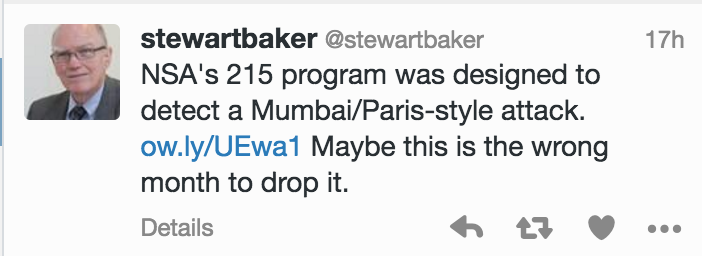Surveillance Hawk Stewart Baker Confirms Dragnet Didn’t Work as Designed
The French authorities are just a day into investigating the horrid events in Paris on Friday. We’ll know, over time, who did this and how they pulled it off. For that reason, I’m of the mind to avoid any grand claims that surveillance failed to find the perpetrators (thus far, French authorities say they know one of the attackers, who is a French guy they had IDed as an extremist, but did not know of people identified by passports found at the Stade — though predictably those have now been confirmed to be fake [update: now authorities say the Syrian one is genuine, though it’s not yet clear it belonged to the attacker], so authorities may turn out to know their real identity). In any case, Glenn Greenwald takes care of that here. I think it’s possible the terrorists did manage to avoid detection via countersurveillance — though the key ways they might have done so were available and known before Edward Snowden’s leaks (as Glenn points out).
But there is one claim by a surveillance hawk that deserves a response. That’s former DHS and NSA official Stewart Baker’s claim that because of this attack we shouldn’t stop the bulk collection of US persons’ phone metadata.
The problem with this claim is that the NSA has a far more extensive dragnet covering the Middle East and Europe than it does on Americans. It can and does bulk collect metadata overseas without the restrictions that existed for the Section 215 dragnet. In addition to the metadata of phone calls and Internet communications, it can collect GPS location, financial information, and other metadata scraped from the content of communications.
The dragnet covering these terrorists is the kind of dragnet the NSA would love to have on Americans, if Americans lost all concern for their privacy.
And that’s just what the NSA (and GCHQ) have. The French have their own dragnet. They already had permission to hold onto metadata, but after the Charlie Hebdo attacks, they expanded their ability to wiretap without court approval. So the key ingredients to a successful use of the metadata were there: the ability to collect the metadata and awareness that one of the people was someone of concern.
The terrorists may have used encryption and therefore made it more difficult for authorities to get to the content of their Internet communications (though at this point, any iPhone encryption would only now be stalling investigators).
But their metadata should still have been available. There’s no good way to hide metadata, which is why authorities find metadata dragnets so useful.
French authorities knew of at least one of these guys, and therefore would have been able to track his communication metadata, and both the Five Eyes and France have metadata dragnets restricted only by technology, and therefore might have been able to ID the network that carried out this attack.
Stewart Baker claims that Section 215 was designed to detect a plot like this. But the metadata dragnet covering France and the Middle East is even more comprehensive than Section 215 ever was. And it didn’t detect the attack (it also didn’t detect the Mumbai plot, even though — or likely because — one of our own informants was a key player in it). So rather than be a great argument for why we need to keep a dragnet that has never once prevented an attack in the US, Baker’s quip is actually proof that the dragnets don’t work as promised.


I take offense at calling Stewart baker a “surveillance hawk”. That appellation does those fierce huntering birds an injustice.
The proper term for Stewart Baker term is “surveillance vulture”, or, in human terms, “surveillance corporation retainer”.
Ah, yes. here it is:
https://theintercept.com/2015/05/12/intelligence-industry-cash-flows-media-echo-chamber-defending-nsa-surveillance/
How to start thinking – before you act – about events like the attacks on France and it’s citizens since last january:
http://www.car-accidents.com/country-car-accidents/france-car-accidents.html
or you can try mass surveillance. but remember, mass surveillance may never work properly as a deterrent without accompanying temporary mass detention.
as it stands practiced now, mass surveillance is mostly to entirely a retrospective, chief inspector smith, type of activity, not a prospective, preventive one. Absent targeting, mass surveillance is blind. With targeting, it is not necessary.
I’m simply not seeing how all this mass surveillance is getting us anywhere. Time and again, these attacks happen, and there’s a lot of running around making excuses for why the surveillance didn’t work – usually along the lines of: well it would’ve worked if we could’ve just done MORE!!!!! Gimme me money!!!!
*
I fail to see how my hard-earned taxes are really doing much good, but I doubt anything will change, other than that more will be spent on useless exercises of futility. And then the Hollywood branch of the CIA will produce some fantasy movie (ala Zero Dark Bullshit) to make it seem like something happened.
*
And so on…
*
Duly noted that some are wasting not an instant in blaming Edward Snowden for something or other. Booga booga scary scary fear fear…. if Snowden hadn’t a done his big “Reveal” why then this wouldn’ta happened. Yeah, right. Sure.
*
And so on.